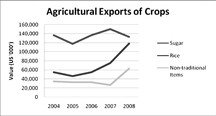Dear Editor,
I wish to refer to AFC Executive Member Mr Sewnauth Punalall’s column entitled ‘Crop Insurance Required for Our Farmers’ dated January 3, 2010, in the Kaieteur News, in which he argued that Guyana needs to increased micro-financing for small entrepreneurs and have a coordinated approach to crop insurance in order to address the issue of food security. Whilst this is true, it must be noted that crop insurance is just one of the issues that needs to be addressed in order to attain food security. This fact has been recognised by the Ministry of Agriculture (MOA) and as such the MOA has undertaken several initiatives to attain sustainable food security in Guyana.
In order to strengthen the agricultural sector so as to maintain sustainable agricultural growth in Guyana, the MOA embarked on the ‘Grow More Campaign’ in 2008. This campaign served as the main driver behind a series of initiatives that followed. In line with the Grow More Campaign, the MOA implemented the Agriculture Sector Development Unit (ASDU) which is the umbrella unit for a series of projects that are currently being undertaken by the MOA.
The ASDU is currently undertaking work that targets small-scale farmers throughout Guyana since the MOA recognises that small-scale farmers make up the majority of the farming community in Guyana and are vital for the achievement of food security. The unit’s work aims at the development of markets and rural enterprises, the strengthening of both human and social capital, the diversification of the agricultural sector so as to reduce the dependency of Guyana’s economy on a few agricultural products, annual investments in drainage and irrigation of $5B, farmers’ training and education enhancement, greater stakeholder dialogue, increase in rice and grain production in the Moco Moco community as well as enhancement of marketing support to farmers.
The execution of the above activities is to enable Guyana to achieve sustainable food security as well as sustainable economic growth, since agriculture is the largest sector in Guyana’s economy and growth in the agricultural sector leads to overall economic growth.
It is well recognised that private sector insurance companies tend not to offer agricultural insurance policies simply because the costs tend to outweigh the benefits due to the fact that agriculture is very risky. This is certainly the situation that exists in many developing countries globally. However, as shown above the MOA has embarked on several initiatives to enable farmers to cushion the effects of the agricultural risks despite the non-existence of crop insurance.
Despite this, one cannot negate the importance of crop insurance for farmers in addressing the issue of food security. As such, the MOA held the ‘Agricultural Symposium on Risk Management’ in order to address the issue of agricultural risk and to derive an agricultural insurance for Guyana, starting with the rice farmers. This symposium consisted of stakeholders from the private sector (chairmen of the commercial banks), the international donor community (Caricom, IICA, World Bank, etc) as well as government representatives (MOA, Nari, New GMC, etc) since the MOA recognises that a collaborative effort is needed for the derivation of an insurance policy.
However, while the MOA recognises the need for crop insurance in Guyana, the goal of the MOA is to assist farmers in managing their business risks through effective, market-based risk management solutions rather than government-led solutions as was done in the past by previous governments.
The success of the MOA’s policies can be reflected in the agricultural export statistics for Guyana. Guyana is known as a net exporter of agricultural products since it produces more than it consumes. Figure 1 below shows that there has been a general increase in the value of non-traditional items (other crops) as well as the value of rice exports over the last five years with sugar being the only crop that has shown a decline in the last five years.
 Figure 1
Figure 1
The MOA has always recognised that the “farmer is indeed the centre of concern in addressing the issue of food security” and as such the policies/programmes that are being undertaken by the MOA all aim to assist/support the farmer in achieving greater efficiency and increase production thus keeping him in farming rather than having him replaced.
As such, leaders and members of the opposition parties need to support the efforts being made by the Government of Guyana in the area of agricultural insurance and not strive to gain political mileage on this issue by striving to claim credit. The MOA hopes that continued support will be given by opposition parties as it strives to maintain and sustain food security in Guyana.
Yours faithfully,
Natasha Gaskin
Senior Analyst
Ministry of Agriculture




